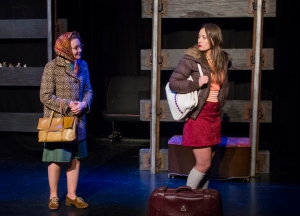This is a play of dual narratives, the stage dominated by two monolithic vertical sections of railway tracks. In 1973, sullen teen Dinah (Hannah Stephens) arrives from care to be fostered by batty but endearing widow, Lotte (Juliet Welch). In World War II, Lotte (Hannah Stephens) is sent to London as a refugee from the Holocaust, leaving her parents to join her later, and is looked after by gruff, irritable Mrs Weston (Juliet Welch). The switched pairing enables both performers to give life to the sympathetic Lotte, while also acting as her foils.

It is a superb piece of writing, drawing ingenious comparisons between the two stories without ever seeming laboured or glib. Young Lotte is an ingénue, loving and earnest, working hard at her English, puzzled by the anti-Semitic graffiti scrawled on her host’s house. Dinah is disaffected and insolent, broken by sexual abuse, only expressing herself through the school poetry that she recites from the railway track which she climbs like a ladder. Both are struck down by circumstance, but endure by their strength.
 The two actors give extraordinary performances, slipping effortlessly between their very different characters in moments. Juliet Welch engages the audience from the very beginning, and sustains the sympathy in Lotte throughout. Hannah Stephens is first pleasingly contemptuous, and then touchingly vulnerable.
The two actors give extraordinary performances, slipping effortlessly between their very different characters in moments. Juliet Welch engages the audience from the very beginning, and sustains the sympathy in Lotte throughout. Hannah Stephens is first pleasingly contemptuous, and then touchingly vulnerable.
Pipeline aims to make theatre with high production values, and here it has certainly succeeded. Poor theatre this is not. The soundscape is lush and detailed: weather sounds from outside as a door is opened; a punctuating railway motif; lengthy sections of (the lamented) Tony Blackburn culled from who knows where. All enhance the drama to a delightful degree.
For my taste, the play ends with a 30 second audio-visual presentation which breaks the spell of the drama, and conveys nothing which couldn’t have been put in the programme. That quibble aside, this is an excellent and affecting piece of drama, warm and human. Do go.
Paul Caira

 Explore All Our Reviews
Explore All Our Reviews